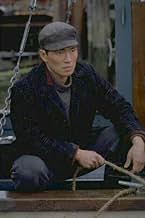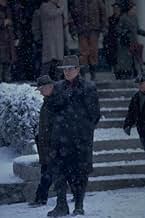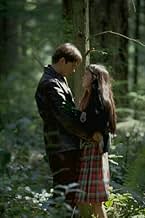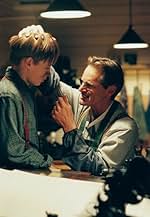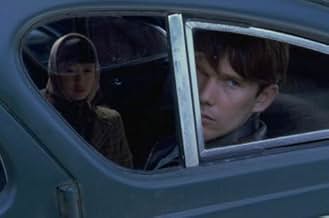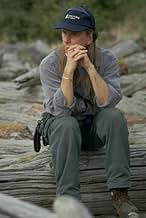Un japonés es acusado del asesinato de un pescador. Durante el juicio, el periodista que se encarga de efectuar la cobertura del proceso, reconoce a la esposa del acusado, su gran amor de ju... Leer todoUn japonés es acusado del asesinato de un pescador. Durante el juicio, el periodista que se encarga de efectuar la cobertura del proceso, reconoce a la esposa del acusado, su gran amor de juventud interrumpido cuando estalló la S.G.M.Un japonés es acusado del asesinato de un pescador. Durante el juicio, el periodista que se encarga de efectuar la cobertura del proceso, reconoce a la esposa del acusado, su gran amor de juventud interrumpido cuando estalló la S.G.M.
- Dirección
- Guionistas
- Elenco
- Nominado a 1 premio Óscar
- 5 premios ganados y 11 nominaciones en total
- Nels Gudmundsson
- (as Max Von Sydow)
- Hatsue Miyamoto
- (as Youki Kudoh)
- Carl Heine Sr.
- (as Daniel Von Bargen)
- Dirección
- Guionistas
- Todo el elenco y el equipo
- Producción, taquilla y más en IMDbPro
Opiniones destacadas
Set in 1950, the film chronicles the effect a mysterious death of a local fisherman has on the populous of a small island community made up mostly of whites and Japanese Americans, a death that, for complicated reasons, awakens many of the racial prejudices still holding over from the recently concluded war. As a Japanese man stands trial for the `murder,' Ishmael Chambers (Ethan Hawke), a mediocre reporter for the local paper, copes with three basic issues: his unrequited love for the defendant's Japanese wife, the flaring-up of anti-Japanese bigotry in both the past and the present, and haunting memories of his deceased father, a socially crusading newspaper publisher, in whose shadow Ishmael toils and against whose professional reputation Ishmael is tested and found wanting.
The film is definitely at its most emotionally powerful in its superb middle section, which beautifully dramatizes, in flashback, the shameful deportation of these Japanese-American citizens to interment camps in California, for no crime more serious than simply being of Japanese descent. Parallels to the rounding up of Jews in Nazi Germany are never far from our minds as we witness this wholesale forced migration of a group of innocent people singled-out to assuage the prejudice and fear of an ignorant but powerful majority. For these scenes alone, the film is most assuredly worth seeing.
Unfortunately, the rest of the film cannot sustain this same intensity of deep emotional conviction. The forbidden interracial childhood romance between Ishmael and Hatsue, the current wife of the man on trial, smacks a bit too much of tired Romeo and Juliet melodramatics. Furthermore, Ishmael seems underdeveloped as a character, too dreamy-eyed and passive, just the kind of character that can be easily swallowed up in a film in which the background plays such a prominent part. Moreover, the easy wrap-up of the trial is woefully unconvincing and unsatisfying both as realism and as drama.
On the positive side, `Snow Falling on Cedars' boasts a fascinating dual-level structure, in which small snippets of information are introduced to us in the form of near-subliminal quick cuts representing memories or speculations on past events, often, oddly, those at which none of the characters involved in the current scene were even present. This latter inconsistency in the film's point-of-view may seem dubious and questionable from a strictly narrative standpoint, but the format does help to flesh out the story and characters in interesting and intriguing ways, intensifying the mystery as we attempt to piece it all together to finally get a view of the whole picture. Director Scott Hicks, along with his co-writer Ron Bass, succeeds in providing a richly detailed glimpse into a shameful episode in American history - and the lyrical quality achieved through Robert Richardson's outstanding cinematography helps the film override some of its more obvious flaws. If one brings an attitude of patience and a fine eye for natural beauty to the film, `Snow Falling on Cedars' turns out to be quite rewarding, especially for those misguided misfits who still, at this late date, justify and defend the actions taken against the American Japanese during the war. This film is a stunning rebuttal to both them and their idiotic notions. For that aspect alone, `Snow Falling on Cedars' demands to be seen.
I loved the intellectual character of the young man who has to look past his own feeling and try to bring closure to someone he will never be able to have. The transitions are so breathtaking. The winter scenes are a portrait of softness and violence. My wife had read the book upon which this is based and said that the movie might be interesting. Apparently, the producers were unwilling to go the extra mile to get this noticed. It's a gem and deserves to be on a list of very fine movies.
Scott Hicks goes for lyrical and he certainly delivers. The cinematography is beautiful, the pace reverberates in space and time. The characters are painted with pointillist precision.
The difficulty is that pointillism is pretty but lacks resolution. There is insufficient time to develop the characters. The urgent and desperate nature of the defendant's plight is lost amongst the beautiful cedars.
Still, if you enjoyed the book then I would recommend seeing this movie.
GOOD NEWS - On the first look, I was totally blown away and dazzled at the fabulous cinematography. Man, this is one of the prettiest movies I've ever seen.....and that's important for my entertainment. Scene after scene looks like some picture postcard. I also enjoyed the two lawyers in this film, played by James Rebhorn and Max VonSydow. Sometimes those two were riveting to watch.
BAD NEWS - Most of the story was anything but riveting, way too slow and with way too much time used on flashbacks. This story could have been told in a much more presentable way which could have kept the audience's attention. It's also a little too politically-correct. We were beaten over the head with the prejudice against Japanese. Everyone here, except the Liberal newspaper editor and his son, is portrayed as extremely bigoted.
Overall, a spectacular visual film - one of the best ever - but a story that takes interminably long to tell.....too long.
It's a small town in the State of Washington; the ninth anniversary of the attack on Pearl Harbor is coming up, and a young man named Kazuo Miyamoto (Rick Yune), a much decorated American soldier during the war, is on trial for the murder of local fisherman Carl Heine (Eric Thal). Covering the trial is reporter Ishmael Chambers (Ethan Hawke), whose father, Arthur (Sam Shepard), had been a respected newspaperman locally for many years, known as a man who was not afraid to speak from his conscience when writing an editorial, and who took a stand for the Japanese locals during the emotionally exasperating years encompassing World War II.
Attempting to objectively cover Kazuo's trial, Ishmael finds himself troubled by a conflict of interests; he has a history with Kazuo's wife, Hatsue (Youki Kudoh), a former relationship reaching back to their childhood, but which ended with the onset of the war. And Ishmael still is grappling with the bitterness he has felt since that time, born of his experiences in the military, as well as Hatsue's rejection of him. And now he is forced to objectively observe this pivotal point in her life, watching from the sidelines and seeing first hand the effects of the prejudice that is very much alive among the local citizenry, and which threatens the assurance of an impartial judgment in Kazuo's case; a judgment that will determine the future of not only Kazuo, but of Hatsue, the woman Ishmael once loved-- and still does.
Working from an intelligent screenplay (by Hicks and Ronald Bass, adapted from the novel by David Guterson), with this film Hicks demonstrates the difference between a visionary filmmaker and someone who just makes movies. In another's hands, because of the story itself, this would have no doubt been an excellent film; with Hicks directing, however, it becomes something much more, as he has taken it beyond excellent, crafting and delivering a film that is thoroughly mesmerizing, majestic and memorable. It's an accomplishment achieved through a visionary presentation, born of the director's sensitive approach to the material and his acute insights into the human condition. Fully utilizing all of the magic at his disposal, Hicks has taken a good film and turned it into an emotionally involving, inspirational and visually poetic experience.
With a haunting score by James Newton Howard underscoring the magnificent cinematography of Robert Richardson, Hicks brings the era and the rural splendor of Washington State vividly to life, creating an aesthetic ambiance that makes the emotional essence of the drama almost tangible; and by exacting some incredible performances from his actors, he sustains that emotional level and combines all of these elements to make this film riveting and unforgettable.
As Ishmael, Ethan Hawke gives a reserved, understated performance, through which he genuinely captures the essence of his character. Watching him, you can sense the turmoil of a soul at cross purposes with itself, and he enables you to sample that taste of bitterness toward life he so desperately needs to overcome if he is to move on within himself to greener pastures. With this role, Hawke was given the opportunity to do something fine, and he succeeds with one of his most memorable performances yet.
Youki Kudoh turns in an extremely affecting performance, as well, as Hatsue. With this moving portrayal of a young woman enduring unbearable inner turmoil, she fulfills the artistic promises made in previous films, such as `Mystery Train' in '89, and `Picture Bride,' in 1965. She's a terrific actor, whose eyes are truly a window to her soul.
Also adding to the success of this film are the supporting efforts of Richard Jenkins, as Sheriff Moran, and James Rebhorn as prosecutor Alvin Hooks. But the most notable performance of all comes from Max von Sydow, who as Kazuo's defense attorney, Nels Gudmundsson, is given an opportunity to return to the kind of role that shaped his career early on under the auspices of Ingmar Bergman. As Nels, von Sydow gives a performance made all the more powerful by the restraint and subtlety of his delivery. He takes what to most actors would be a good part, and makes it a cohesive element of the film. It's a performance that by all rights should have earned von Sydow an Oscar nomination, but sadly did not.
The supporting cast includes Reeve Carney (Young Ishmael), Ann Suzuki (Young Hatsue), James Cromwell (Judge Fielding), Ariia Bareikis (Susan Marie), Celia Weston (Etta) and Daniel von Bargen (Carl). In a year (1999) that saw lesser efforts acknowledged, `Snow Falling On Cedars' was inexplicably ignored at Oscar time (except for Richardson's most deserving nomination for cinematography); an injustice, to say the least, as this was clearly one of the best films of the year. Reminiscent of Ang Lee's artistry, yet with a style uniquely his own, Hicks has given us a poetic film of rare beauty and conscience, for which he is hereby granted an Award in it's purest form:
The gratitude of an appreciate audience. 10/10.
¿Sabías que…?
- TriviaWhen the Japanese-Americans are sent to internment camps, many of the extras were Japanese-Americans who had actually been sent to the camps in the 1940s.
- ErroresJapanese guests wear black ties at the wedding. They should be wearing white ties. In Japan, black ties are for funerals.
- Citas
Nels Gudmundsson: It takes a rare thing, a turning point, to free oneself from any obsession. Be it prejudice or hate, or, even love.
- Créditos curiososJan Rubes and Sheila Moore are on the credits despite their scenes being deleted.
- Bandas sonorasMoon over Burma
Written by Friedrich Hollaender (as Frederick Hollander), Frank Loesser
Performed by Dorothy Lamour
Courtesy of the RCA Records Label of BMG Entertainment
Selecciones populares
- How long is Snow Falling on Cedars?Con tecnología de Alexa
Detalles
- Fecha de lanzamiento
- País de origen
- Sitios oficiales
- Idiomas
- También se conoce como
- Snow Falling on Cedars
- Locaciones de filmación
- Productoras
- Ver más créditos de la compañía en IMDbPro
Taquilla
- Presupuesto
- USD 35,000,000 (estimado)
- Total en EE. UU. y Canadá
- USD 14,417,593
- Fin de semana de estreno en EE. UU. y Canadá
- USD 32,135
- 26 dic 1999
- Total a nivel mundial
- USD 23,049,593
- Tiempo de ejecución2 horas 7 minutos
- Color
- Mezcla de sonido
- Relación de aspecto
- 2.39 : 1


